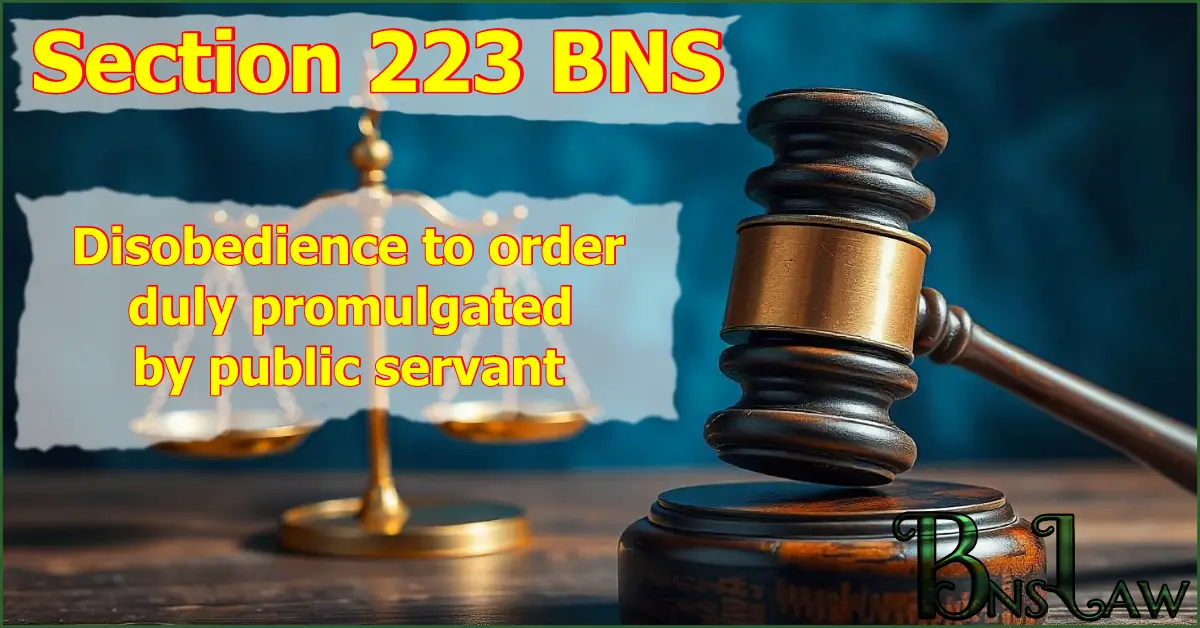Section 223 BNS | BNS 223
Whoever, knowing that, by an order promulgated by a public servant lawfully empowered to promulgate such order, he is directed to abstain from a certain act, or to take certain order with certain property in his possession or under his management, disobeys such direction,—
223(a) BNS
shall, if such disobedience causes or tends to cause obstruction, annoyance or injury, or risk of obstruction, annoyance or injury, to any person lawfully employed, be punished with simple imprisonment for a term which may extend to six months, or with fine which may extend to two thousand and five hundred rupees, or with both;
223(b) BNS
and where such disobedience causes or tends to cause danger to human life, health or safety, or causes or tends to cause a riot or affray, shall be punished with imprisonment of either description for a term which may extend to one year, or with fine which may extend to five thousand rupees, or with both.
Explanation— It is not necessary that the offender should intend to produce harm, or contemplate his disobedience as likely to produce harm. It is sufficient that he knows of the order which he disobeys, and that his disobedience produces, or is likely to produce, harm.
READ OTHER SECTIONS OF CHAPTER XIII — OF CONTEMPTS OF THE LAWFUL AUTHORITY OF PUBLIC SERVANTS
FAQs of BNS Section 223
-
223 BNS punishment and fine
Punishment and fine under Section 223 of the BNS—
223(a): Simple imprisonment for 6 months, or fine of 2,500 rupees, or both.
223(b): Imprisonment for 1 year, or fine of 5,000 rupees, or both. -
223 BNS cognizable or not
The offence under Section 223(a) and 223(b) of the BNS is cognizable.
-
223 BNS bailable or not
The offence under Section 223(a) and 223(b) of the BNS is bailable.
-
223 BNS trial court
Offence specified in Section 223(a) and 223(b) of the BNS is triable by any Magistrate.
Important Points
- Cognizable Offences: These are offences where a police officer can arrest a person without a warrant.
- Non-Cognizable Offences: These are offences where a police officer cannot arrest a person without a warrant.
- Bailable Offences: These are offences where the accused can get bail from the police station itself. All bailable offences are listed in the First Schedule of the Bharatiya Nagarik Suraksha Sanhita (BNSS).
- Non-Bailable Offences: Offences in which bail is not granted directly from the police station but after hearing the case in the court, the judge decides when bail will be granted. All non-bailable offences are listed in the first schedule of the Bharatiya Nagarik Suraksha Sanhita (BNSS).
- In the above FAQ, “trial court” means the court that has jurisdiction to try the offence.
- In the above FAQ, the expression “Magistrate of the first class” and “Any Magistrate” does not include Executive Magistrates.
Read other Sections of the BNS
Reference Link: New Criminal Laws (BNS), Ministry of Home Affairs







